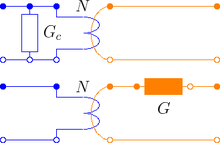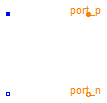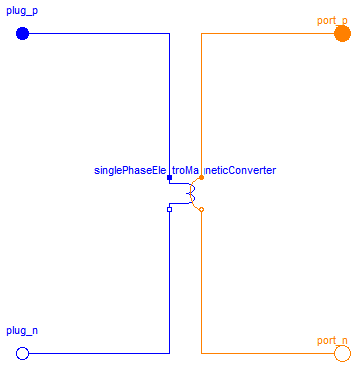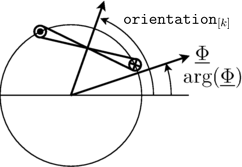Basic components of the FundamentalWave library for modeling magnetic circuits. Machine specific components are located at Machines.Components.
Extends from Modelica.Icons.Package (Icon for standard packages).
| Name | Description |
|---|---|
| Magnetic ground | |
| Salient reluctance | |
| Constant loss model under sinusoidal magnetic conditions | |
| Single phase electro magnetic converter | |
| Multi phase electro magnetic converter | |
| Salient reluctance | |
| Salient reluctance |
 Modelica.Magnetic.FundamentalWave.Components.Ground
Modelica.Magnetic.FundamentalWave.Components.Ground

Grounding of the complex magnetic potential. Each magnetic circuit has to be grounded at least one point of the circuit.
| Type | Name | Description |
|---|---|---|
| PositiveMagneticPort | port_p | Complex magnetic port |
model Ground "Magnetic ground"Interfaces.PositiveMagneticPort port_p "Complex magnetic port"; equation port_p.V_m = Complex(0,0);end Ground;
 Modelica.Magnetic.FundamentalWave.Components.Reluctance
Modelica.Magnetic.FundamentalWave.Components.Reluctance

The salient reluctance models the relationship between the complex magnetic potential difference
 and the complex magnetic flux
and the complex magnetic flux  ,
,

which can also be expressed in terms complex phasors:

Extends from Modelica.Magnetic.FundamentalWave.Interfaces.PartialTwoPortElementary (Two magnetic ports for textual modeling).
| Type | Name | Default | Description |
|---|---|---|---|
| SalientReluctance | R_m | Magnetic reluctance in d=re and q=im axis |
| Type | Name | Description |
|---|---|---|
| PositiveMagneticPort | port_p | Positive complex magnetic port |
| NegativeMagneticPort | port_n | Negative complex magnetic port |
model Reluctance "Salient reluctance"
import Modelica.Constants.pi;
extends Modelica.Magnetic.FundamentalWave.Interfaces.PartialTwoPortElementary;
parameter Modelica.Magnetic.FundamentalWave.Types.SalientReluctance R_m(
d(start=1), q(start=1)) "Magnetic reluctance in d=re and q=im axis";
equation
(pi/2) * V_m.re = R_m.d * Phi.re;
(pi/2) * V_m.im = R_m.q * Phi.im;
end Reluctance;
 Modelica.Magnetic.FundamentalWave.Components.EddyCurrent
Modelica.Magnetic.FundamentalWave.Components.EddyCurrent

The eddy current loss model with respect to fundamental wave effects is designed in accordance to FluxTubes.Basic.EddyCurrent.
 .
.

|
Due to the nature of eddy current losses, which can be represented by symmetric
conductors in an equivalent electric circuit (Fig. 1), the respective
number of phases  has to be taken into account.
Assume that the
has to be taken into account.
Assume that the  conductances
of the equivalent circuit are
conductances
of the equivalent circuit are  ,
the conductance for the eddy current loss model is determined by
,
the conductance for the eddy current loss model is determined by

where  is the number of turns of the symmetric electro magnetic coupling.
is the number of turns of the symmetric electro magnetic coupling.
For such an  phase system
the relationship between the voltage and current space phasors
and the magnetic flux and magnetic potential difference phasor is
phase system
the relationship between the voltage and current space phasors
and the magnetic flux and magnetic potential difference phasor is
 ,
,
 ,
,
where  and
and  are the phase voltages and currents, respectively.
are the phase voltages and currents, respectively.
The dissipated loss power

can be determined for the space phasor relationship of the voltage and current space phasor.
Extends from Modelica.Magnetic.FundamentalWave.Interfaces.PartialTwoPortElementary (Two magnetic ports for textual modeling), Modelica.Thermal.HeatTransfer.Interfaces.PartialElementaryConditionalHeatPort (Partial model to include a conditional HeatPort in order to dissipate losses, used for textual modeling, i.e., for elementary models).
| Type | Name | Default | Description |
|---|---|---|---|
| Conductance | G | Eqivalent symmetric loss conductance [S] | |
| Boolean | useHeatPort | false | =true, if heatPort is enabled |
| Temperature | T | 273.15 | Fixed device temperature if useHeatPort = false [K] |
| Type | Name | Description |
|---|---|---|
| PositiveMagneticPort | port_p | Positive complex magnetic port |
| NegativeMagneticPort | port_n | Negative complex magnetic port |
| HeatPort_a | heatPort | Optional port to which dissipated losses are transported in form of heat |
model EddyCurrent
"Constant loss model under sinusoidal magnetic conditions"
import Modelica.Constants.pi;
extends Modelica.Magnetic.FundamentalWave.Interfaces.PartialTwoPortElementary;
parameter Modelica.SIunits.Conductance G(min=0)
"Eqivalent symmetric loss conductance";
extends Modelica.Thermal.HeatTransfer.Interfaces.PartialElementaryConditionalHeatPort
(final T = 273.15);
equation
lossPower = (pi/2)*(V_m.re*der(Phi.re) + V_m.im*der(Phi.im));
if G>0 then
(pi/2) * V_m.re = G * der(Phi.re);
(pi/2) * V_m.im = G * der(Phi.im);
else
V_m.re = 0;
V_m.im = 0;
end if;
end EddyCurrent;
 Modelica.Magnetic.FundamentalWave.Components.SinglePhaseElectroMagneticConverter
Modelica.Magnetic.FundamentalWave.Components.SinglePhaseElectroMagneticConverter

The single phase winding has an effective number of turns,  and a respective orientation of the winding,
and a respective orientation of the winding,  . The current in winding is
. The current in winding is  .
.
The total complex magnetic potential difference of the single phase winding is determined by:

In this equation the magneto motive force is aligned with the orientation of the winding.
The voltage  induced in the winding depends on the cosine between the orientation of the winding and the angle of the complex magnetic flux. Additionally, the magnitudes of the induced voltages are propotional to the respective number of turns. This relationship can be modeled by means of
induced in the winding depends on the cosine between the orientation of the winding and the angle of the complex magnetic flux. Additionally, the magnitudes of the induced voltages are propotional to the respective number of turns. This relationship can be modeled by means of

The single phase electro magnetic converter is a special case of the MultiPhaseElectroMagneticConverter
MultiPhaseElectroMagneticConverter
| Type | Name | Default | Description |
|---|---|---|---|
| Real | effectiveTurns | Effective number of turns | |
| Angle | orientation | Orientation of the resulting fundamental wave V_m phasor [rad] |
| Type | Name | Description |
|---|---|---|
| PositivePin | pin_p | Positive pin |
| NegativePin | pin_n | Negative pin |
| PositiveMagneticPort | port_p | Positive complex magnetic port |
| NegativeMagneticPort | port_n | Negative complex magnetic port |
model SinglePhaseElectroMagneticConverter "Single phase electro magnetic converter" import Modelica.Constants.pi;Modelica.Electrical.Analog.Interfaces.PositivePin pin_p "Positive pin"; Modelica.Electrical.Analog.Interfaces.NegativePin pin_n "Negative pin"; Interfaces.PositiveMagneticPort port_p "Positive complex magnetic port"; Interfaces.NegativeMagneticPort port_n "Negative complex magnetic port"; parameter Real effectiveTurns "Effective number of turns"; parameter Modelica.SIunits.Angle orientation "Orientation of the resulting fundamental wave V_m phasor"; // Local electric single phase quantities Modelica.SIunits.Voltage v "Voltage drop"; Modelica.SIunits.Current i "Current"; // Local electromagnetic fundamental wave quantities Modelica.SIunits.ComplexMagneticPotentialDifference V_m "Complex magnetic potential difference"; Modelica.SIunits.ComplexMagneticFlux Phi "Complex magnetic flux"; final parameter Complex N= effectiveTurns * Modelica.ComplexMath.exp(Complex(0,orientation)) "Complex number of turns"; equation // Magnetic flux and flux balance of the magnetic ports port_p.Phi = Phi; port_p.Phi + port_n.Phi = Complex(0,0); // Magnetic potential difference of the magnetic ports port_p.V_m - port_n.V_m = V_m; // Voltage drop between the electrical pins v = pin_p.v - pin_n.v; // Current and current balance of the electric pins i = pin_p.i; pin_p.i + pin_n.i = 0; // Complex magnetic potential difference is determined from currents, number // of turns and angles of orientation of winding // V_m.re = (2/pi) * effectiveTurns*cos(orientation)*i; // V_m.im = (2/pi) * effectiveTurns*sin(orientation)*i; V_m = (2.0/pi) * N * i; // Induced voltages is determined from complex magnetic flux, number of turns // and angles of orientation of winding // -v = effectiveTurns*cos(orientation)*der(Phi.re) // + effectiveTurns*sin(orientation)*der(Phi.im); -v = Modelica.ComplexMath.real(Modelica.ComplexMath.conj(N)*Complex(der(Phi.re),der(Phi.im)));end SinglePhaseElectroMagneticConverter;
 Modelica.Magnetic.FundamentalWave.Components.MultiPhaseElectroMagneticConverter
Modelica.Magnetic.FundamentalWave.Components.MultiPhaseElectroMagneticConverter

Each phase  of an
of an  phase winding has an effective number of turns,
phase winding has an effective number of turns,  and an respective winging angle
and an respective winging angle  and a phase current
and a phase current  .
.
The total complex magnetic potential difference of the mutli phase winding is determined by:

In this equation each contribution of a winding magneto motive force on the total complex magnetic potential difference is aligned with the respective orientation of the winding.
The voltages  induced in each winding depend on the cosinus between the orientation of the winding and the angle of the complex magnetic flux. Additionally, the magnitudes of the induced voltages are propotional to the respective number of turns. This relationship can be modeled by means of
induced in each winding depend on the cosinus between the orientation of the winding and the angle of the complex magnetic flux. Additionally, the magnitudes of the induced voltages are propotional to the respective number of turns. This relationship can be modeled by means of

for  and is also illustrated by the following figure:
and is also illustrated by the following figure:

|
SinglePhaseElectroMagneticConverter
| Type | Name | Default | Description |
|---|---|---|---|
| Integer | m | 3 | Number of phases |
| Real | effectiveTurns[m] | Effective number of turns | |
| Angle | orientation[m] | Orientation of the resulting fundamental wave field phasor [rad] |
| Type | Name | Description |
|---|---|---|
| PositivePlug | plug_p | Positive plug |
| NegativePlug | plug_n | Negative plug |
| PositiveMagneticPort | port_p | Positive complex magnetic port |
| NegativeMagneticPort | port_n | Negative complex magnetic port |
model MultiPhaseElectroMagneticConverter "Multi phase electro magnetic converter" import Modelica.Constants.pi;Modelica.Electrical.MultiPhase.Interfaces.PositivePlug plug_p( final m=m) "Positive plug"; Modelica.Electrical.MultiPhase.Interfaces.NegativePlug plug_n( final m=m) "Negative plug"; Modelica.Magnetic.FundamentalWave.Interfaces.PositiveMagneticPort port_p "Positive complex magnetic port"; Modelica.Magnetic.FundamentalWave.Interfaces.NegativeMagneticPort port_n "Negative complex magnetic port"; parameter Integer m = 3 "Number of phases"; parameter Real effectiveTurns[m] "Effective number of turns"; parameter Modelica.SIunits.Angle orientation[m] "Orientation of the resulting fundamental wave field phasor";Modelica.Magnetic.FundamentalWave.Components.SinglePhaseElectroMagneticConverter singlePhaseElectroMagneticConverter[m]( final effectiveTurns=effectiveTurns, final orientation=orientation); equationconnect(plug_p.pin, singlePhaseElectroMagneticConverter.pin_p); connect(singlePhaseElectroMagneticConverter.pin_n, plug_n.pin); connect(singlePhaseElectroMagneticConverter[1].port_p, port_p); for k in 2:m loop connect(singlePhaseElectroMagneticConverter[k-1].port_n,singlePhaseElectroMagneticConverter[k].port_p); end for;connect(singlePhaseElectroMagneticConverter[m].port_n, port_n); end MultiPhaseElectroMagneticConverter;
 Modelica.Magnetic.FundamentalWave.Components.Idle
Modelica.Magnetic.FundamentalWave.Components.Idle

This is a simple idle running branch.
Extends from Modelica.Magnetic.FundamentalWave.Interfaces.PartialTwoPortElementary (Two magnetic ports for textual modeling).
| Type | Name | Description |
|---|---|---|
| PositiveMagneticPort | port_p | Positive complex magnetic port |
| NegativeMagneticPort | port_n | Negative complex magnetic port |
model Idle "Salient reluctance" extends Modelica.Magnetic.FundamentalWave.Interfaces.PartialTwoPortElementary; equation Phi = Complex(0,0);end Idle;
 Modelica.Magnetic.FundamentalWave.Components.Short
Modelica.Magnetic.FundamentalWave.Components.Short

This is a simple short cut branch.
Extends from Modelica.Magnetic.FundamentalWave.Interfaces.PartialTwoPort (Two magnetic ports for graphical modeling).
| Type | Name | Description |
|---|---|---|
| PositiveMagneticPort | port_p | Positive complex magnetic port |
| NegativeMagneticPort | port_n | Negative complex magnetic port |
model Short "Salient reluctance" extends Modelica.Magnetic.FundamentalWave.Interfaces.PartialTwoPort; equationconnect(port_p, port_n); end Short;